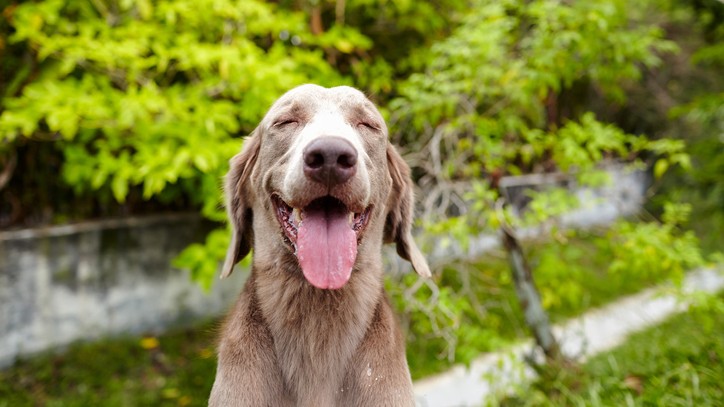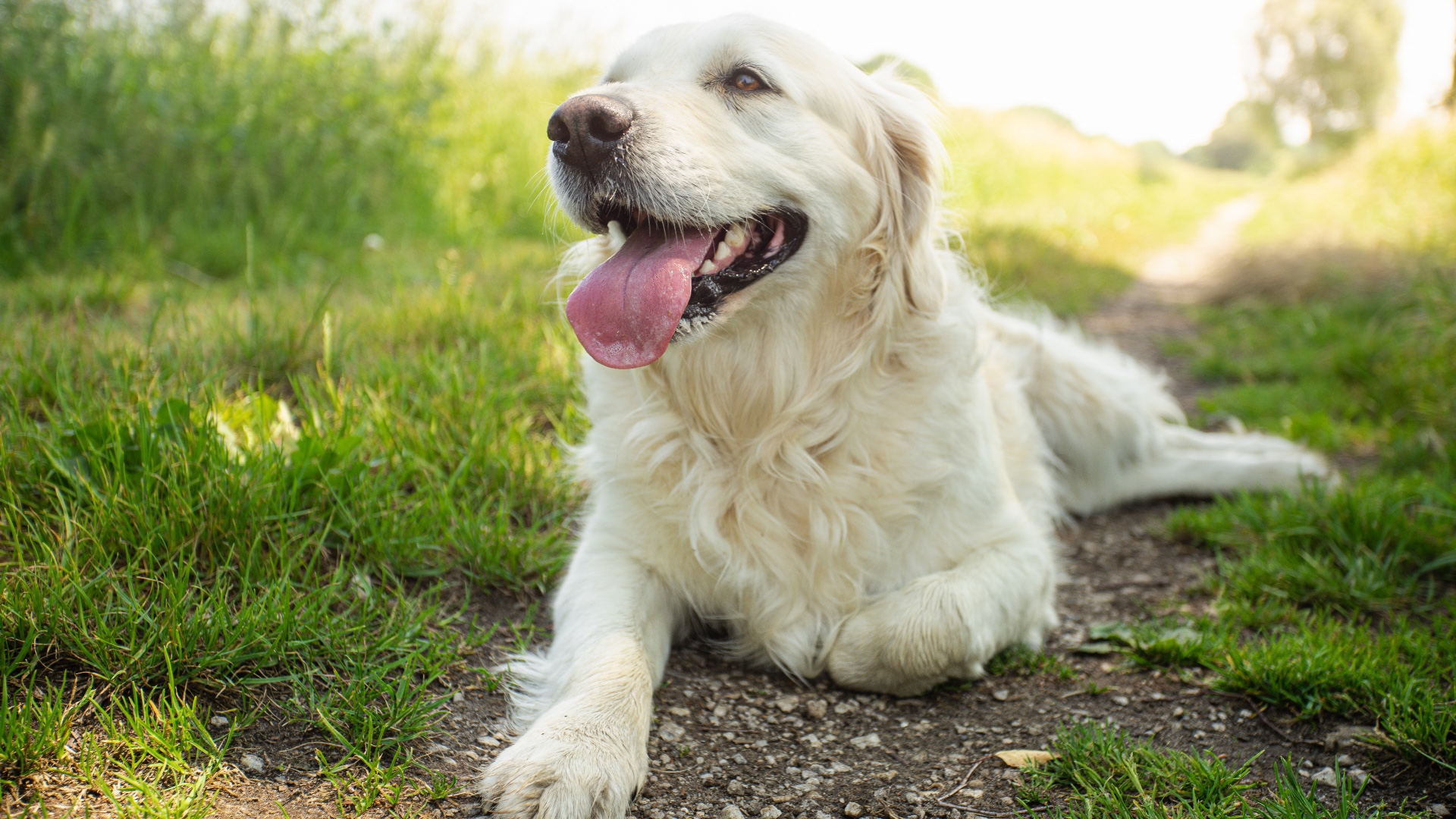Why is my dog panting so much?
If you find yourself thinking ‘why is my dog panting so much?’, here are some possible reasons

Get the best advice, tips and top tech for your beloved Pets
You are now subscribed
Your newsletter sign-up was successful
When is it normal for a dog to pant, and why is my dog panting so much? If you're out on a walk with your canine companion and it's a warm day, there are lots of hills, or they've run to fetch the ball a few times, you might not be too concerned about why they’re panting so much.
Equally, if they’re haring around off-lead on the beach or having some strenuous rough and tumble with their furry friends in the park, they will probably start panting and take a while to catch their breath. So, what are the reasons why dogs pant? And if your dog is panting excessively could it be a sign of an underlying health condition?
They’re too warm
If your dog is feeling the heat, either because it’s a hot day or because they’ve been doing lots of fun, but strenuous, activities, they will pant. Panting allows them to cool down in two ways. Firstly, the evaporation of saliva from their tongue will gradually lower their body temperature, but also the increased breathing rate will help them expel heat more quickly.
Don't be fooled though, the act of panting can also increase your dog's body temperature, particularly if they pant in an enclosed space or their panting is prolonged. It's also worth noting that panting only works to a point, and if it's a hot day or your dog is really exerting themselves and unable to cool down, they are at risk of heat stroke, which can be serious, or even fatal. Be sure you know how to cool down a dog in an emergency.
They’re afraid or anxious
If your dog has a phobia such as fireworks or thunder, you'll probably find they pant during these times. Similarly, if your dog has separation anxiety, they probably spend a lot of time panting when you leave them alone in the house. Any source of fear or anxiety, including the car or even your postman, could cause your dog to pant.
They’re in pain
Dogs can also pant as a sign of pain or discomfort. If your pooch is in pain, you may also notice them being restless and struggling to find a comfy place to settle. Although some causes of pain are obvious, such as if your dog has a limp or a wound, other sources of pain may be internal or may not be visible, so panting could be the only sign that something is wrong.
They’re overweight
If your pooch is a little bit podgy, those extra pounds could make breathing more difficult, meaning that they struggle to get the oxygen they need through normal breathing. If you notice your dog panting more and they have recently gained some weight, this could be the reason.
Get the best advice, tips and top tech for your beloved Pets
Putting them on a doggy diet and seeing if their panting improves would be a good first step, but don’t forget to consult your veterinarian if their excessive panting continues.
They’re brachycephalic
Even though it's common for brachycephalic breeds such as French Bulldogs, Pugs, and British Bulldogs to pant, snort, and snore due to their flat faces and squashed airways, it is still a serious concern.
Brachycephalic Obstructive Airway Syndrome, where the airways are narrowed or obstructed by small nostrils, a long soft palate, a short nose, or a small windpipe not only causes serious breathing distress, it can also lead to regurgitation, acid reflux, inflammation of the esophagus and even aspiration pneumonia.
They have another medical problem

Although panting can be normal, excessive panting can be a sign of various other health conditions. For instance, dogs with heart failure often pant to try to keep up with the body’s oxygen demand when the heart isn’t pumping effectively. These dogs might have a cough and pale or slightly blue gums, and they may not be able to exercise like they used to.
Dogs with an overactive adrenal gland, also known as Cushing's disease, can also pant excessively, as well as showing changes in their thirst, urination, appetite, skin, and body shape.
Other medical conditions that may cause your dog to pant are infections or inflammation affecting the lungs, such as pneumonia or an allergic reaction where the airways have become affected by swelling.
How to calm a panting dog
If your dog is panting without a clear cause, try the following techniques to help calm them down. However, if there is any concern that your dog is struggling to breathe this is an emergency requiring urgent veterinary care and you should take your dog immediately to the nearest emergency clinic.
- Take them somewhere shady and cool to rest
- Offer them a cool (but not ice cold) drink of water
- Talk to them calmly using soothing tones to help them settle down
- Avoid additional stimulation, such as other dogs or people, if possible
When to worry about your dog’s panting
Dog’s usually take up to 30-40 breaths per minute depending on their size, but panting is much faster and can be up to 10 times the normal rate! Though panting is a natural mechanism to help our pups cool down, it’s important to recognize the signs of abnormal panting:
- Panting without an obvious cause (your dog isn’t warm, hasn’t recently exercised, or doesn’t appear anxious or stimulated)
- Excessive panting compared to what is usual for your pup
- Breathing louder than normal or abnormal noises when breathing
- Struggling or appearing tired when exercising normally
- Restlessness or signs of pain
- Struggling to breath and pale or blue tinged gums
When to take your dog to the vet for panting
If your dog is showing any of the signs mentioned above, or your dog’s panting isn’t settling down, they should see a veterinarian as soon as possible. Even if you aren’t sure, it’s always better to be safe than sorry and to get your dog checked over by a vet if you have any concerns, as abnormal breathing or panting can be a sign of a serious health problem.
If you are concerned that your pup is struggling to breathe, or has pale or blue-tinged gums, it’s important to take them to an emergency veterinarian immediately. If you have someone with you they can call the clinic in advance to let them know you’re on your way.
You might also want to read: How much water should my dog drink?
Dr Hannah Godfrey is a small animal vet who graduated from the Royal Veterinary College in 2011 and began work straight away at a busy mixed practice. Initially, she treated all species, but focussed on small animals from 2014. She has a passion for soft tissue surgery, ultrasound, and canine and feline dentistry, having completed additional training in these areas.

